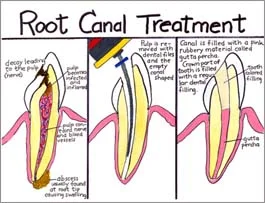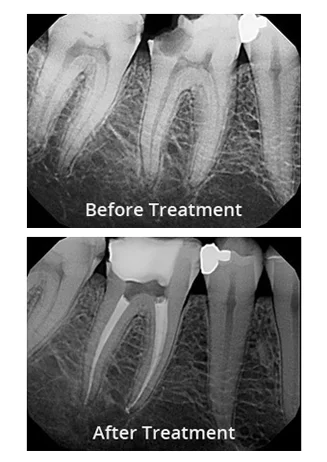Root canal treatment is a dental procedure in which the diseased or damaged pulp (core) of a tooth is removed and cleaned out of any infection in the pulp and root canals. This tissue, called the pulp, contains nerves and blood vessels that help nourish the tooth. After the pulp is removed, the pulp chamber and root canal system is cleaned, shaped, disinfected and sealed.
The most common causes of pulp damage or death are :
- A cracked tooth
- A deep cavity
- An injury to a tooth, such as a severe knock to the tooth, either recent or in the pas
Once the pulp is infected or dead, if left untreated, pus can build up at the root tip in the jawbone, forming an abscess. An abscess can destroy the bone surrounding the tooth and cause pain
Root canal treatment consists of several steps that take place over several office visits, depending on the situation. These steps are:
- First, an opening is made through the back of a front tooth or the crown of a molar or pre-molar.
- After the diseased pulp is removed (a pulpectomy), the pulp chamber and root canals are cleaned, enlarged and shaped in preparation for being filled.
- A temporary filling is placed in the crown opening to protect the tooth between dental visits.
- In the next visit, The temporary filling is removed and the pulp chamber and root canal permanently filled. A tapered, rubbery material called gutta-percha is inserted into each of the canals and is often sealed into place with cement. Sometimes a metal or plastic rod is placed in the canal for structural support.
- In the final step, a crown is usually placed over the tooth to restore its natural shape and appearance. If the tooth is very broken down, a post may be required to build it up prior to placing a crown.
Your treated and restored tooth/teeth can last a lifetime with proper care. Because tooth decay can still occur in treated teeth, good oral hygiene and regular dental exams are necessary to prevent further problems. As there is no longer a pulp keeping the tooth alive, root-treated teeth can become brittle and are more prone to fracture. This is an important consideration when deciding whether to crown or fill a tooth after root canal treatment.

- Prolonged sensitivity to heat or cold foods and liquids.
- Swelling and pain.
- Pain while biting or chewing
- Tenderness to touch and chewing
- Persistent bad taste in the mout








